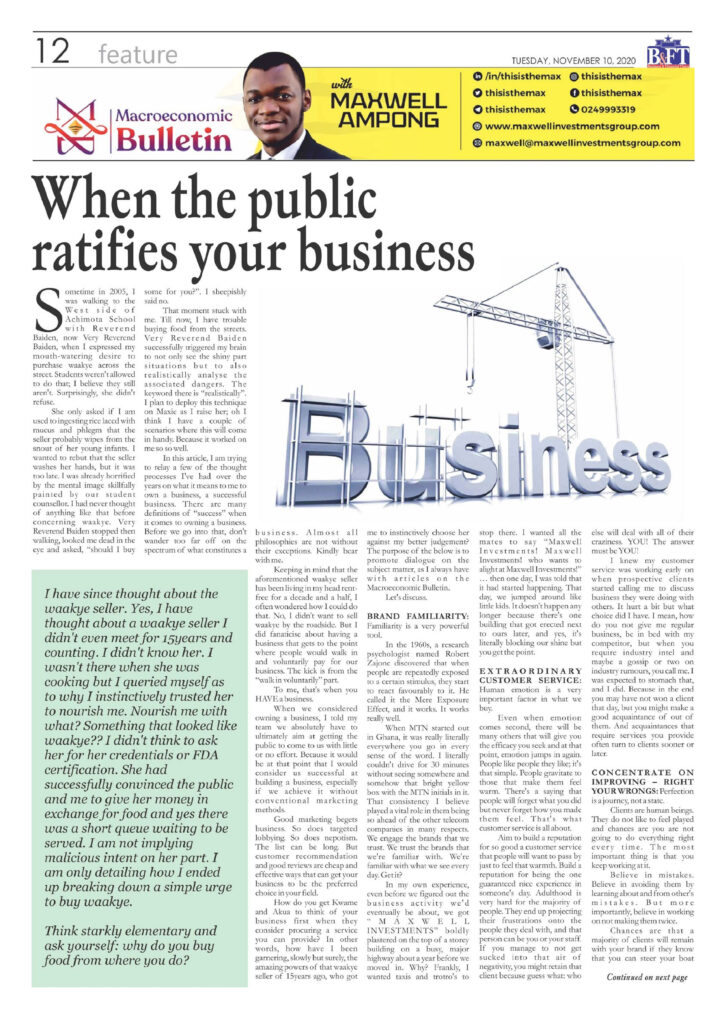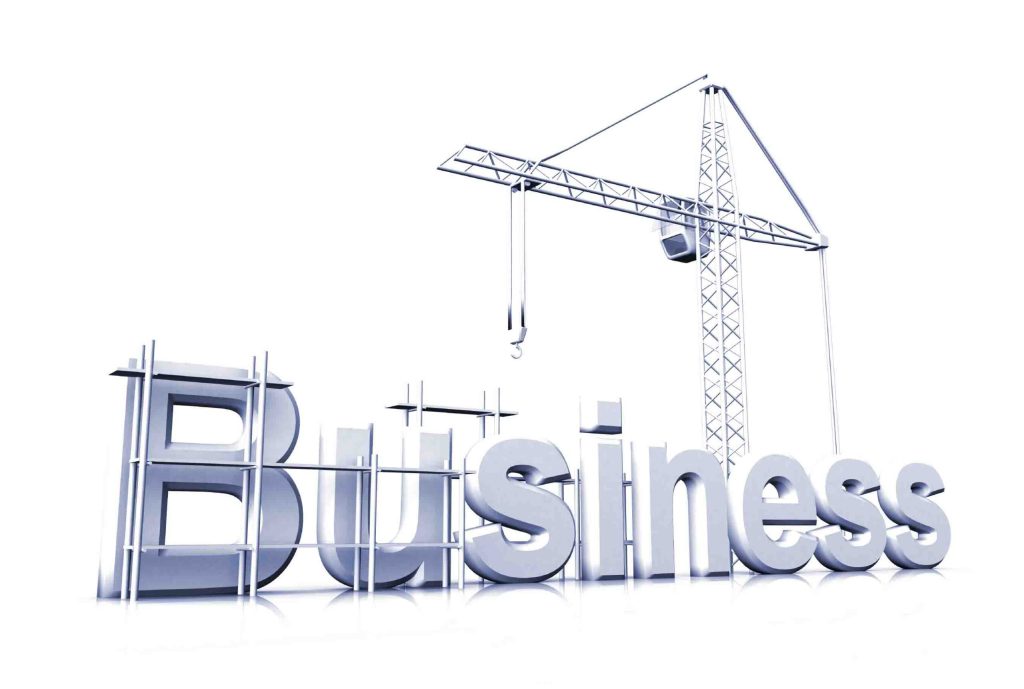
Sometime in 2005, I was walking to the West side of Achimota School with Reverend Baiden, now Very Reverend Baiden, when I expressed my mouth-watering desire to purchase waakye across the street. Students weren’t allowed to do that; I believe they still aren’t. Surprisingly, she didn’t refuse.
She only asked if I am used to ingesting rice laced with mucus and phlegm that the seller probably wipes from the snout of her young infants. I wanted to rebut that the seller washes her hands, but it was too late. I was already horrified by the mental image skillfully painted by our student counsellor. I had never thought of anything like that before concerning waakye. Very Reverend Baiden stopped then walking, looked me dead in the eye and asked, “should I buy some for you?”. I sheepishly said no.
That moment stuck with me. Till now, I have trouble buying food from the streets. Very Reverend Baiden successfully triggered my brain to not only see the shiny part situations but to also realistically analyse the associated dangers. The keyword there is “realistically”. I plan to deploy this technique on Maxie as I raise her; oh I think I have a couple of scenarios where this will come in handy. Because it worked on me so so well.
I have since thought about the waakye seller. Yes, I have thought about a waakye seller I didn’t even meet for 15years and counting. I didn’t know her. I wasn’t there when she was cooking but I queried myself as to why I instinctively trusted her to nourish me. Nourish me with what? Something that looked like waakye?? I didn’t think to ask her for her credentials or FDA certification. She had successfully convinced the public and me to give her money in exchange for food and yes there was a short queue waiting to be served. I am not implying malicious intent on her part. I am only detailing how I ended up breaking down a simple urge to buy waakye.
Think starkly elementary and ask yourself: why do you buy food from where you do?
In this article, I am trying to relay a few of the thought processes I’ve had over the years on what it means to me to own a business, a successful business. There are many definitions of “success” when it comes to owning a business. Before we go into that, don’t wander too far off on the spectrum of what constitutes a business. Almost all philosophies are not without their exceptions. Kindly bear with me.
Keeping in mind that the aforementioned waakye seller has been living in my head rent-free for a decade and a half, I often wondered how I could do that. No, I didn’t want to sell waakye by the roadside. But I did fanaticise about having a business that gets to the point where people would walk in and voluntarily pay for our business. The kick is from the “walk in voluntarily” part.
To me, that’s when you HAVE a business.
When we considered owning a business, I told my team we absolutely have to ultimately aim at getting the public to come to us with little or no effort. Because it would be at that point that I would consider us successful at building a business, especially if we achieve it without conventional marketing methods.
Good marketing begets business. So does targeted lobbying. So does nepotism. The list can be long. But customer recommendation and good reviews are cheap and effective ways that can get your business to be the preferred choice in your field.
How do you get Kwame and Akua to think of your business first when they consider procuring a service you can provide? In other words, how have I been garnering, slowly but surely, the amazing powers of that waakye seller of 15years ago, who got me to instinctively choose her against my better judgement? The purpose of the below is to promote dialogue on the subject matter, as I always have with articles on the Macroeconomic Bulletin.
Let’s discuss.
BRAND FAMILIARITY: Familiarity is a very powerful tool.
In the 1960s, a research psychologist named Robert Zajonc discovered that when people are repeatedly exposed to a certain stimulus, they start to react favourably to it. He called it the Mere Exposure Effect, and it works. It works really well.
When MTN started out in Ghana, it was really literally everywhere you go in every sense of the word. I literally couldn’t drive for 30 minutes without seeing somewhere and somehow that bright yellow box with the MTN initials in it. That consistency I believe played a vital role in them being so ahead of the other telecom companies in many respects. We engage the brands that we trust. We trust the brands that we’re familiar with. We’re familiar with what we see every day. Get it?
In my own experience, even before we figured out the business activity we’d eventually be about, we got “MAXWELL INVESTMENTS” boldly plastered on the top of a storey building on a busy, major highway about a year before we moved in. Why? Frankly, I wanted taxis and trotro’s to stop there. I wanted all the mates to say “Maxwell Investments! Maxwell Investments! who wants to alight at Maxwell Investments!” … then one day, I was told that it had started happening. That day, we jumped around like little kids. It doesn’t happen any longer because there’s one building that got erected next to ours later, and yes, it’s literally blocking our shine but you get the point.
EXTRAORDINARY CUSTOMER SERVICE: Human emotion is a very important factor in what we buy.
Even when emotion comes second, there will be many others that will give you the efficacy you seek and at that point, emotion jumps in again. People like people they like; it’s that simple. People gravitate to those that make them feel warm. There’s a saying that people will forget what you did but never forget how you made them feel. That’s what customer service is all about.
Aim to build a reputation for so good a customer service that people will want to pass by just to feel that warmth. Build a reputation for being the one guaranteed nice experience in someone’s day. Adulthood is very hard for the majority of people. They end up projecting their frustrations onto the people they deal with, and that person can be you or your staff. If you manage to not get sucked into that air of negativity, you might retain that client because guess what: who else will deal with all of their craziness. YOU! The answer must be YOU!
I knew my customer service was working early on when prospective clients started calling me to discuss business they were doing with others. It hurt a bit but what choice did I have. I mean, how do you not give me regular business, be in bed with my competitor, but when you require industry intel and maybe a gossip or two on industry rumours, you call me. I was expected to stomach that, and I did. Because in the end you may have not won a client that day, but you might make a good acquaintance of out of them. And acquaintances that require services you provide often turn to clients sooner or later.
CONCENTRATE ON IMPROVING – RIGHT YOUR WRONGS: Perfection is a journey, not a state.
Clients are human beings. They do not like to feel played and chances are you are not going to do everything right every time. The most important thing is that you keep working at it.
Believe in mistakes. Believe in avoiding them by learning about and from other’s mistakes. But more importantly, believe in working on not making them twice.
Chances are that a majority of clients will remain with your brand if they know that you can steer your boat right when it gets off its course. A mistake only irritates in the beginning. An unresolved mistake is what breeds harsh sentiment and bad reviews. Bad reviews spread faster by the way because people like to avoid loss and bad experiences. So, whether the mistakes are your fault or that of the customer, it’s your fault that you couldn’t curate a smooth experience for your customer; think of it like that.
When we started, I was notorious for apportioning blame during a pitch, and for good reason. I spoke to the team about it and they fell in line with it perfectly. My reasoning was, if the buck stops with me, and I am wrong, then we are all wrong. Better to demonstrate a clear path to solving the problem in order to salvage whatever trust is left from the client.
One time, many many years ago, we gave this disastrous first pitch and when I say “we”, I mean I. Whenever the prospective client exclaimed at some misguided point, one team member would apologise for not doing enough research or something like that and then another will apologise for mixing our facts and so on and so forth. If we lost that business, it would have been understandable. But after the pitch, I gave the client a firm assurance that I was going to handle his account personally henceforth, I apologised for the errors of my staff (go figure!), took his advice on how to run my team better (they always do that), and then I totally aced the next pitch alone (to demonstrate a change).
I always want to make clients feel like if something goes left or right, they can trust me to not play games but even more importantly, that I will fix it.
Aside from the fact that it’s almost 12am on a Friday night, I have to stop typing now because the point has been made. I have expanded on 3 how’s. Build brand familiarity, give extraordinary customer care, and work on accepting and improving mistakes. There are others. Offer a guarantee one way or the other and do not fail to deliver on that guarantee. Build home support wherever your business is, for people like to support their own, arguably. Have Loyalty Schemes. Execute good pricing strategies. Partner with popular people to increase your approachability. Utilise Social Media. Provide Free WiFi (it’s a people magnet in 2020). Create scarcity. There are many other how’s.
Here is where all that should be headed: people should walk into your office without question. Your name should be the first they mention instinctively when they need the services you can provide. You should have people come to you for value, and for reliability. If your target market feels anything akin to what I felt 15years ago when I wanted to buy that waakye in Motown, my friend, you’re winning!
I hope you found this article insightful and enjoyable. Subscribe to the ‘Entrepreneur In You’ newsletter here: https://lnkd.in/d-hgCVPy.
I wish you a highly productive and successful week ahead!
♕ —- ♕ —- ♕ —- ♕ —- ♕
Disclaimer: The views, thoughts, and opinions expressed in this article are solely those of the author, Dr. Maxwell Ampong, and do not necessarily reflect the official policy, position, or beliefs of Maxwell Investments Group or any of its affiliates. Any references to policy or regulation reflect the author’s interpretation and are not intended to represent the formal stance of Maxwell Investments Group. This content is provided for informational purposes only and does not constitute legal, financial, or investment advice. Readers should seek independent advice before making any decisions based on this material. Maxwell Investments Group assumes no responsibility or liability for any errors or omissions in the content or for any actions taken based on the information provided.


